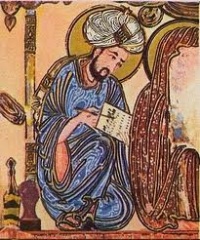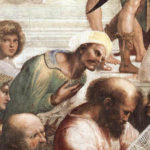
The Mu‘tazila was an Islamic theological sect that emerged in the late Umayyad period in the city of Basra and flourished during the ‘Abbāsid era. The Mu‘tazila played a pivotal role on both the intellectual and political levels. The intellectual methodology of the Mu‘tazilites predominately relied upon reason in matters of doctrine, and prioritised this over passive transmission. They rejected the hadiths and argued for the need to know God via reason. If the text contradicted the rational mind, they prioritised the latter since it constituted the fundamental basis, and thereby held the intellect as legitimate and obligated.
AMONG THE MOST FAMOUS Mu‘tazilites were Wāṣil ibn ‘Aṭā’, ‘Amr ibn ‘Ubayd, Ibrāhīm al-Naẓẓām, Hishām ibn ‘Amr al-Fūṭī, Al-Zamakhsharī the author of the commentary Al-Kashshāf, Al-Jāḥiẓ, the Caliph Al-Ma’mūn, and the judge ‘Abd al-Jabbār. They rejected the hadiths and argued for the need to know God via reason. If the text contradicted the rational mind, they prioritised the latter since it constituted the fundamental basis, and thereby held the intellect as legitimate and obligated. Among the most famous Mu‘tazilites were Wāṣil ibn ‘Aṭā’, ‘Amr ibn ‘Ubayd, Ibrāhīm al-Naẓẓām, Hishām ibn ‘Amr al-Fūṭī, Al-Zamakhsharī the author of the commentary Al-Kashshāf, Al-Jāḥiẓ, the Caliph Al-Ma’mūn, and the judge ‘Abd al-Jabbār.
The most important pillars upon which the Mu‘tazila founded itself were the five principles of tawḥīd, justice, al-wa‘d wal-wa‘īd (‘the warning and the promise’ i.e. the inevitability of the threats and promises of God), the intermediary position (al-manzila bayn al-manzilatayn or ‘status between two statuses’), and the promotion of virtue and prevention of vice.
Tawḥīd,[1]
The oneness of God stands as the principal origin of religion, and the first and most important feature that Islam based itself upon. In this context, they presented an image of the absolute transcendence of God, and professed a oneness far removed from all forms of anthropomorphism and embodiment. The Mu‘tazila confirmed the divine names and the seven divine attributes (knowledge – power – will – life – hearing – sight – speech).
Justice
God’s judgments were to be measured according to what reason and wisdom demanded, and on this basis denied or confirmed the existence of things. They thus denied that God created or was responsible for the actions of His servants, instead holding that: ‘the servants are the creators of their own actions, be they good or evil.
The ‘intermediary’ position
This principle is concerned with the immoral governance in this world. The Mu‘tazila believed that the immoral person in this world could not be called a ‘believer’ in any way, nor could he be called an ‘infidel’ either, but occupied a position between these two. If he repented he has returned to the fold of the faithful; if he died persisting in his immorality he was to be numbered among those punished eternally in the torment of Hellfire.
‘The warning and the promise’
What is meant by this is the enforcement of the threatened punishment in the Hereafter upon those who have committed cardinal sins, whereby God will not accept intercession for them or release them from Hellfire. They are kuffār in that they have placed themselves outside the fold of the faith community and will be punished by Hellfire for all eternity. Even so, their punishment is lighter than that which will be inflicted upon the outright disbelievers.
The promotion of virtue and prevention of vice.
This principle illustrates the position of the Mu‘tazilites towards those who commit cardinal sins, be they rulers or subjects. They saw unjust leaders fighting out of sheer immorality, and held that it was obligatory to disassociate from them whenever possible.
The Mu‘tazilites were insistent on their rational reading of the religious text, irrespective of its believed sanctity
There are other doctrines that characterized the thought of the Mu‘tazilites. Among these we may mention:
Negation of the ancient sempiternity of God’s attributes
The Mu‘tazilites denied that God’s attributes were eternally the same, because they saw that to maintain the sempiternally ancient attributes of God was to maintain the existence of other beings as ancient as God, and this would contradict tawḥīd and lead to anthropomorphism. Therefore the Mu‘tazilites denied the existence of these attributes being ancient. As for the relationship of attributes to the Godhead, the Mu‘tazilites did not see that there was a true division of these attributes from the Divine Being, since they were nothing other than the Divine Being’s self-expression.
Divine speech and the problem of the createdness of the Qur’ān[2]
The Qur’ān, for the Mu‘tazilites, was something that had been created, and the same applied to the words of God. The Mu‘tazilites subjected the religious texts to a rational reading. They considered that the Qur’ān contained different, and sometimes contradictory, texts including those which were commands and prohibitions, or contained promises and threats, or had legal implications or were the record of events. At the same time it also combined spiritual and worldly elements. If it was unreasonable to attribute these contradictions to God, then it is necessary to resort to reason in order to interpret what is stated in the Qur’ān. This in itself, strips the Qur’ān of any ‘eternal’ status and removes the sanctity from its texts, because, as the Mu‘tazila asserted, “the words of God are recent and created in a specific place”.[3]

Suggested Reading
Ibn Rushd and the problem of the rational and the transmitted
In addition, the Mu‘tazila denied the Qur’ānic text’s status as a miracle (al-i‘jāz), which in the unanimous opinion of Muslim believers constituted an offence against its sanctity. In this aspect, as in the issue of the createdness of the Qur’ān, the Mu‘tazilites were insistent on their rational reading of the religious text, rejecting everything that reason did not accept, irrespective of its believed sanctity.
The Mu‘tazilites were in the past excommunicated and their ideas obliterated, yet the hope always remains for a new and enlightening reading of the religious Text, a reading far from the violent, superstitious, and contradictory features that characterise Islam today.
We can but hope.
[1] See Glossary: Tawhīd.
[2] On this important doctrine, see the Almuslih backgrounder paper on Khalq al-Qur’ān here. (Ed.)
[3] ‘Abd al-Jabbār argued that since the Qur’ān had “some passages preceding other passages, the Text cannot be considered sempiternally ancient, since no part of it could therefore precede another part of it.” (Ed.)
